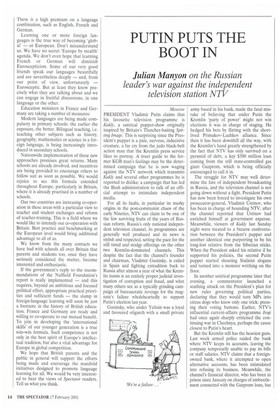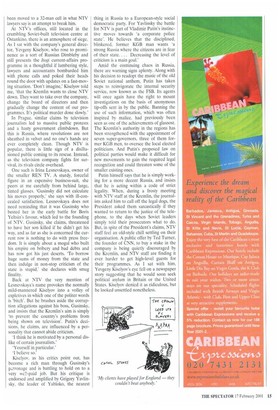PUTIN PUTS THE BOOT IN
Julian Manyon on the Russian
leader's war against the independent television station NTV
Moscow PRESIDENT Vladimir Putin claims that his favourite television programme is Kukly, a satirical puppet-show originally inspired by Britain's Thatcher-baiting Spitting Image. This is surprising since the President's puppet is a pale, nervous, indecisive creature, a far cry from the judo black-belt action man that the Kremlin press service likes to portray. A truer guide to the former KGB man's feelings may be the determined campaign that he is now waging against the NTV network which transmits Kukly and several other programmes he is reported to dislike; a campaign that has led the Bush administration to talk of an official attempt to intimidate independent media.
For all its faults, in particular its murky origins in the post-communist chaos of the early Nineties, NTV can claim to be one of the few surviving fruits of the years of Russian reform. Russia's only national independent television channel, its programmes are generally well produced and its news is stylish and respected, setting the pace for the still timid and stodgy offerings on the other two Kremlin-dominated channels. This despite the fact that the channel's founder and chairman, Vladimir Gusinsky, is exiled in Spain and fighting extradition back to Russia after almost a year of what the Kremlin insists is an entirely proper judicial investigation of corruption and fraud, and what many others see as a typically grinding campaign of bureaucratic revenge for the magnate's failure wholeheartedly to support Putin's election last year.
Gusinsky, who under Yeltsin was a loyal and favoured oligarch with a small private army based in his bank, made the fatal mistake of believing that under Putin the Kremlin 'party of power' might not win elections it was in charge of staging. He hedged his bets by flirting with the shortlived Primakov-Luzhkov alliance. Since then it has been downhill all the way, with the Kremlin's hand greatly strengthened by the fact that NTV has only survived on a pyramid of debt, a key $300 million loan coming from the still state-controlled gas giant Gazprom, which is being officially encouraged to call it in.
The struggle for NTV may well determine the fate of independent broadcasting in Russia, and the television channel is not going down without a fight. President Putin has now been forced to investigate his own prosecutor-general, Vladimir Ustinov, who has been in charge of hounding NTV, after the channel reported that Ustinov had enriched himself at government expense. Meanwhile, viewers of Kukly last Sunday night were treated to a bizarre confrontation between the President's puppet and another identical one purporting to be his long-lost relative from the Siberian sticks. When the President asked his relative if he supported his policies, the second Putin puppet started shouting Stalinist slogans and turned into a monster writhing on the floor.
In another satirical programme later that evening, a commentator launched a scathing attack on the President's plan for new rules governing political parties, declaring that they would turn MPs into circus dogs who knew only one trick: pressing their voting buttons. Earlier. NTV's influential current-affairs programme Itogi had once again sharply criticised the continuing war in Chechnya, perhaps the cause closest to Putin's heart.
But the Kremlin still has the heaviest guns. Last week armed police raided the bank where NTV keeps its accounts, leaving the company temporarily unable to pay its bills or staff salaries. NTV claims that a foreignowned bank, where it attempted to open alternative accounts, has been intimidated into refusing its business. Meanwhile, the channel's financial director, who has been in prison since January on charges of embezzlement connected with the Gazprom loan, has been moved to a 32-man cell in what NTV lawyers say is an attempt to break him.
At NTV's offices, still located in the crumbling Soviet-built television centre at Ostankino, there is an atmosphere of siege. As I sat with the company's general director, Yevgeny Kiselyov, who rose to prominence as a sort of Russian Dimbleby and still presents the Itogi current-affairs programme in a thoughtful if lumbering style, lawyers and accountants bombarded him with phone calls and poked their heads round the door with updates on a fast-moving situation. 'Don't imagine,' Kiselyov told me, 'that the Kremlin wants to close NTV down. They want to take over the company, change the board of directors and then gradually change the content of our programmes. It's political murder done slowly.'
In Prague, similar claims by television journalists led to massive public protests and a hasty government climbdown. But this is Russia, where revolutions are not sheathed in velvet and no one's hands are ever completely clean. Though NTV is popular, there is little sign of a disillusioned public coming to its rescue. Instead, as the television company fights for survival, its rivals circle overhead.
One such is Irina Lesnevskaya, owner of the smaller REN TV. A sturdy, forceful figure in an expensive business-suit, she peers at me carefully from behind large, tinted glasses. `Gusinsky did not calculate his moves properly,' she says with ill-concealed satisfaction. Lesnevskaya does not need reminding that it was Gusinsky who bested her in the early battle for Boris Yeltsin's favour, which led to the founding of NTV. Gusinsky, she claims, threatened to have her son killed if he didn't get his way, and as far as she is concerned the current row is nothing to do with press freedom. It is simply about a mogul who built his empire on bribery and bad debts and has now got his just deserts. 'To borrow huge sums of money from the state and then indulge in non-stop criticism of the state is stupid,' she declares with smug finality.
Back at NTV the very mention of Lesnevskaya's name provokes the normally mild-mannered Kiselyov into a volley of expletives in which one of the politer words is 'bitch'. But he brushes aside the corruption allegations against his boss, Gusinsky, and insists that the Kremlin's aim is simply 'to prevent the country's problems from being shown on television'. Putin's decisions, he claims, are influenced by a personality that cannot abide criticism.
'I think he is motivated by a personal dislike of certain journalists.'
'Yourself in particular.'
'I believe so.'
Kiselyov, as his critics point out, has become a rich man through Gusinsky's patronage and is battling to hold on to a very well-paid job. But his critique is endorsed and amplified by Grigory Yavlinsky, the leader of Yabloko, the nearest thing in Russia to a European-style social democratic party. For Yavlinsky the battle for NTV is part of Vladimir Putin's instinctive moves towards 'a corporate police state'. He believes that the disciplined, blinkered, former KGB man wants 'a strong Russia where the citizens are in fear of their state. . . . Decreasing the level of criticism is a main goal.'
Amid the continuing chaos in Russia, there are warning signs aplenty. Along with his decision to readopt the music of the old Soviet national anthem, Putin has taken steps to reinvigorate the internal security service, now known as the FSB. Its agents will once again have the right to mount investigations on the basis of anonymous tip-offs sent in by the public. Banning the use of such information, which was often inspired by malice, had previously been seen as one of the achievements of glasnost. The Kremlin's authority in the regions has been strengthened with the appointment of seven super-governors, three of them former KGB men, to oversee the local elected politicians. And Putin's proposed law on political parties would make it difficult for new movements to gain the required legal recognition and could threaten some of the smaller existing ones.
Putin himself says that he is simply working for a more decent Russia, and insists that he is acting within a code of strict legality. When, during a frosty meeting with NTV staff at the Kremlin, the journalists asked him to call off the legal dogs, the President asked them sarcastically if they wanted to return to the justice of the telephone, to the days when Soviet leaders simply told their prosecutors what to do. But, in spite of the President's claims, NTV staff feel an old-style chill settling on their organisation. A public offer by Ted Turner, the founder of CNN, to buy a stake in the company is being quietly discouraged by the Kremlin. and NTV staff are finding it ever harder to get high-level guests for their programmes. As I sat with him, Yevgeny Kiselyov's eye fell on a newspaper story suggesting that he would soon seek political asylum in Britain or the United States. Kiselyov denied it as ridiculous, but he looked unsettled nonetheless.



































































 Previous page
Previous page